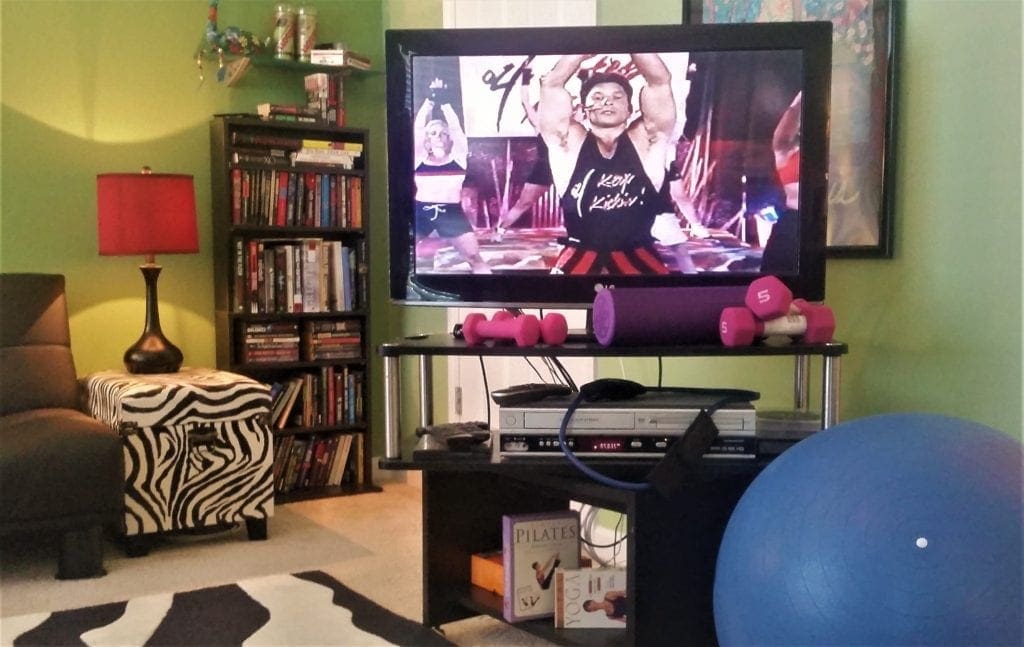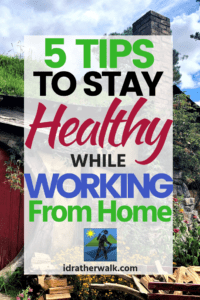Most recently updated November 24th, 2022
Estimated Reading Time: 15 minutes
Have you become a remote worker recently due to circumstances beyond your control? Whether you have chosen remote work, or it’s been thrust upon you, it can be a difficult transition for you and your whole family.
You can find yourself getting stressed, socially awkward, and extra fluffy 🙂
And this can add additional stress, which creates a really bad cycle that it’s best to avoid altogether.
So, that said, what’s the best way to protect your mental and physical health when you’re suddenly forced to work from your home???

People who had already chosen to work remotely before any Stay At Home mandates have probably figured this out already.
But for those who became remote workers overnight due to the COVID-19 health crisis response or other sudden life change, this could be a problem – especially if there’s no end in sight.
As an aside, I joined the workforce when there was no such thing as “remote” work, because there were no laptops, internet or cell phones.
…. I’ll pause here so you can say “Okay, Boomer” 🙂
I also remember when working remotely was the shiny new Holy Grail of work situations, and only the Cool Kids got to do it.
The rest of us had to fight family, school buses and traffic to make it into the office on time despite a blizzard or an illness that had you burning with fever.

Those days are not entirely gone, but most companies now recognize natural disasters, communicable diseases, and different time-zones within Global teams as valid reasons to work off-site.
Fortunately, with today’s technology everyone is able to work remotely as needed, if your business will allow it.
Some people work remotely 100% of the time now and some younger workers have NEVER had an office-based job.

At this point in my career, I’ve worked in all kinds of remote, half-remote, on-site only, etc etc situations, and I have to say – I really like working from home most of all!
But working remotely is not everyone’s favorite thing.
When working from home – whether it’s as someone’s else’s employee or as your own boss – there are a lot of bad habits you can fall into.
Finding the discipline to manage your time and ignore distractions, especially if you’ve also got kids at home – never mind anxiety about world events, or depression due to isolation – may be unusually difficult.
And staying focused enough to get some exercise and eat right can be almost impossible!
There are some tricks I’ve learned over the years that might help you 🙂
Some of my posts contain affiliate links. If you make a purchase through an affiliate link, I will receive a small payment at no additional cost to you. As an Amazon Associate, and other marketing affiliations, I earn from qualifying purchases. See full Disclosure page here.
Disclaimer
Working from home can be really hard – especially if you’re not accountable to anyone else on a daily basis.
Some days you feel like you’ve gotten nothing done, other days you’re so busy it gets to be late afternoon and you haven’t left the house – or put on pants!
The most important thing is to find out what works for you and do the best you can to maintain healthy habits and life/work balance.
That said, although I know what I’m supposed to be doing to be healthy every day, sometimes I just don’t do it.
Well, on those occasions just “do as I say, not as I do”. 😉

Seriously, no one gets it perfect every day.
So if you’re trying to be healthy while working remotely and you didn’t stick to the exact routine you wanted today, don’t beat yourself up, there’s always a do-over tomorrow!
And if for whatever reason you’re feeling distracted, unmotivated, stressed out and overwhelmed – I guarantee you will feel better if you get outside and go for a walk in the sunshine.
Benefits and Pitfalls of Remote Work
There are undeniable benefits to working remotely, especially if – for whatever reason – you’re working from home.
Those benefits include:
-
- The freedom and flexibility to work in familiar surroundings,
- No co-workers to distract you,
- Being able to wear what you want,
- Time with your pets and/or kids, and
- The opportunity to do some chores.
But according to Dr. Josh Klapow, clinical psychologist, for every benefit there’s a potential downside.
“Working from home is not for everyone,” he says. “In fact, it can be as much a distraction as it is a productive environment.”

The Downside of Remote Work
You may not be distracted by co-workers when you work from home, but there are plenty of opportunities for procrastination, like:
-
-
- Household chores,
- Pets (or kids) demanding attention,
- Streaming your favorite shows, or
- Websurfing.
-
And when you’re working from home, it’s too easy to skip your workouts, regular meals, social interaction, and even sleep, if you don’t consciously promote healthy habits for work/life balance.
Aren’t We Already Isolated Enough?

Americans have become less social in general, and with the new “delivery culture” coming out of the COVID-19 pandemic (along with continuing fear of personal interactions), it doesn’t seem like that trend is going to turn around.
While working from home has a lot of benefits, in a time where all of our interactions are increasingly distanced, removing ourselves from yet another social community seems like it could be a bad idea.
Paring down your personal interactions might decrease your exposure to germs and stress from irritating people, but it can also have negative consequences.
For a growing number of people, the office work group is really the only social group they engage with.
Social isolation is a real thing — especially for people who really thrive on those connections with other people, but all of us benefit from social bonds,” says Cathleen Swody, an industrial and organizational psychologist.
Cabin Fever and Loneliness

Even if you’re someone who enjoys long stretches of uninterrupted time alone, you can still be susceptible to loneliness and cabin fever – which can be bad for you physically as well as emotionally.
In fact, studies show that loneliness can shorten your lifespan on a similar scale to smoking 15 cigarettes a day.
Extended alone time also leads to social awkwardness where you forget how to make small talk or behave at parties 🙂
The key to avoiding becoming hermit-like is to make it a point to get out of the house, every day if possible.
So, if you haven’t been outside or seen another human in days, it might be time to give yourself an intervention.
It doesn’t have to be a scheduled thing to meet friends – just take a trip to the park or the drugstore and witness other people out and about doing regular people things. 🙂
You Can Never Escape the Office
If you work from home, there is no longer a “work” and “no work” time. Your work happens at all hours – especially if you are part of a global team.
Setting strict work-life balance boundaries will help keep you sane and offer you the protection you may need from yourself.

Protect Your Work-Life Balance
I’ve noticed that when I work at home, it’s a lot harder to put work away at the end of the day and focus on my family and non-work things.
Leaving a physical office made this separation much easier, with the commute providing a “buffer zone” and time for attitude adjustment before you got home.
Try to put away home distractions during normal working hours, so you can focus and get your work done by the end of a traditional work day. Then step away from your keyboard.
That said, you may not find it so easy to turn off your brain.

Fight, Flight or Sneeze?
While our ancestors could engage their fight-or-flight response to escape a tiger that was chasing them, our modern predators are not so easily eluded.
Even at home, workplace politics, economic downturns, and other disturbing news pursue us through all lines of communication, and once they enter our minds we can’t outrun them.

Because our brains can’t tell the difference between bad news and a ravenous tiger, we engage the fight-or-flight response constantly and can end up in a state of chronic stress.
Emotionally, this is upsetting, but it gets even worse at the molecular level.

A particular set of genes (in immune cells)respond to chronic stress with something called the CTRA (conserved transcriptional response to adversity).
How does the CTRA work?
-
- The production of inflammatory proteins increases and stays high. (While short-lived acute inflammation increases immune system activity to fight injury or infection, chronic inflammation persists beyond the threat, and can be harmful.)
- As a result, the CTRA undermines resistance to viral infections. (This is key in the context of situations like viral pandemics.)
A Stressful Disconnect
Chronic stress, and the CTRA, has created a particular result in our daily lives.
-
- Physically, the chronic inflammation in our cells creates fertile ground for diseases like diabetes, obesity, heart disease, autoimmune diseases, mood disorders and viral infections.
- Mentally and emotionally, it means we’re always distracted and anxious.
- Socially, this sense of separation then feeds any existing social isolation and loneliness, to create a self-perpetuating circle.
If you can’t seem to stop worrying, it can help get some strenuous exercise or get out of the house and do something completely unrelated to work.

Distractions And Detractions
When working from home, things like unmade beds, unfinished projects, the great outdoors, and a fully stocked kitchen can tempt you away from your work.
And, if you aren’t working with a team, it can also feel like no one cares whether you get your work done or not.
It doesn’t help that if you work from home, friends and family don’t seem to think you’re doing anything of value, either…..
No one believes you’re actually working
Although working from home has become less unusual, people who are not in industries where that’s feasible still don’t really get it.
People will assume that if you work from home, you don’t really work that much or are available to do things anytime without an appointment.
The good news is you can mitigate this if you always refer to your home office as “the office”, and put on some pants…
(What is it with the pants, anyway?)
But, seriously, just keep quietly working along, protect your boundaries – and later you can smile at everyone’s astonishment when you make your first million and retire early 🙂
Most household chores fall on you
If you’re living alone, move along. This section is not for you – unless you’ve got a really talented cat…
But if you’re living with a roommate, spouse, and/or other family, working from home can lead to you getting stuck with more than your share of household chores because you’re “technically” home all of the time.
It starts with little things, like accepting deliveries, or letting the plumber in.

That seems reasonable.
But before you know it, you’re skipping workouts, finishing up the dishes every day, and are always the designated babysitter when a kid gets sick or school’s out for a snow day.
You really need to set the boundaries upfront and make it clear that even though your office is at home, this is your workday.
You’re not there to handle groceries, laundry, or dishes.

What NOT To Do
Here are three things successful people never do when working from home:
1. Working in Pajamas
While the idea of working in your sweatpants without judgment might sound nice, they aren’t exactly professional attire — and they won’t put your mind in “work mode.”
A study from Northwestern University, showed that employees, no matter what profession they’re in, perform tasks better when they wear business-like clothes.
Looking well-groomed and presentable will also save you from rushing to get ready each time the doorbell rings or an impromptu video meeting comes up.
2. Going Dark
Successful people who work from home make it a point to over-communicate.
Check and reply to emails at least once per day (more often if there’s something urgent happening).
At the very least, have regular check-ins with your manager and team — talk about your goals for the week and ask for feedback.
This will reassure everyone that you’re actually online and working, and will also help you build more sustainable relationships with the people you work with.

3. Neglecting Health
It’s well known that commuting is one of the worst things for your health and productivity.

But even without the enforced inactivity of commuting time, when you work from home, there can be even less physical activity!
There are no conference meeting rooms to walk to, no coworkers to go on a coffee run with and no long hallways that lead to the printer or bathroom.
Even if you’re a frequent exerciser, according to a study published in the Annals of Internal Medicine, sitting for excessively long periods of time can put you at risk of early death.
Make it a point to carve out time throughout the day to take walks (having a dog makes it easier).
Or, you can squeeze in a workout in the 30 minutes you have between calls – especially if they’re voice only 🙂
Better yet, schedule your workouts just as you would any other appointment in your day and put them on your calendar.

The Top 5 Work From Home Tips
Whether you’re a seasoned remote worker or working remotely for the first time, check out these tips for staying healthy when you work from home.
1. Create a Designated Work Area
Take a look at your home office area – is the room dark or sunny? Is the temperature comfortable or is it so warm you’re falling asleep?
These things will affect your mental health – and your physical health as well.
Raise the blinds to get a boost of vitamin D, open the windows for some fresh air, and add some plants for increased happiness and a host of other health benefits.
When choosing an area of your home to work in, consider factors like location, lighting, and noise level.
Make sure your chair is comfortable and turn your desk to face the window.

Jonathan Cinkay, a physical therapist and body mechanics coordinator at the Hospital for Special Surgery in New York, says that the best ergonomic foundation is a desk and chair setup where your elbows can be bent to 90 degrees.
The top of your monitor should be eye level so you don’t strain your neck. If you can’t raise it, set it on top of a few books.
If you use a laptop, the most important thing is still to raise the screen up to eye level. (This may mean you need to invest in a separate mouse and keyboard so you can keep those on the desk while your computer is propped up.)
“Laptops are much lower, and people tend to bend forward at the waist and curl over and look down at the screen, and they cause lots of back and neck issues,” Cinkay says.

Take Care of Your Eyes
Just like the rest of your body, you need to give your eyeballs a break when you work from home.
Make sure to look away from your screen every 20 minutes or so, for at least 20 seconds or longer.
That will give your eyes a chance to recuperate and avoid eye strain and potential headaches.
2. Schedule Your Day
It’s critical to create structure to your day – even a loose outline can help you stay on task and prioritize your workload.
-
- First, set clear start and finish times for your workday and have a task list.
- Next, schedule a lunch break and time for meetings and phone calls, plus realistic (but adjustable) windows of time to accomplish the most important items on your list.
When creating your schedule, think about what time of day you feel most energized and alert, and when you feel most sluggish or prone to distraction.

Develop a Shutdown Ritual
When you’re already home, the line between work and “home” time can be a bit blurry.

That’s why it’s helpful to develop a routine that simultaneously signals the end of the workday and helps you transition away from emails and work projects.
Your shutdown ritual can be as simple as closing your laptop and storing it out of sight, or doing something more involved, like a workout or leaving the house for a stroll or errands.
3. Relax… Within Reason
Working from home means you have the luxury of taking an occasional break without having to keep an eye out for your boss.
If you’re not careful, though, a mini-break can easily turn into a video binge or hours-long nap.
Do something calming for a break that won’t cause you to doze off – cook a healthy meal, take a brisk walk, or do some yoga.

Get Up and Move
When you start working from home, you might find that it’s easy to spend the entire day heads down working away and never leave the house.
Problem is, if you do this for too long, it can affect your mental health. Make a point to leave the house on foot at least once a day.
Stopping your work every hour to take even a 10-minute break can make all the difference.
Better still, use a portion of your lunch break to take a 20-minute walk around your neighborhood—or make use of that gym membership you signed up for but haven’t used yet. 😉

4. Sit Down to Eat
It’s normal for some of us to plow through the workday without stopping to refuel, but scheduling time for breakfast, lunch, and dinner can actually boost your productivity.
While you do eat, sit down to a meal at your kitchen table, not your work desk!
Snack as if Somebody’s Watching

When you’re by yourself at home, there’s no one but you to see what you’re munching on.
To avoid unhealthy eating habits, plan out your meals and snacks ahead of time.
Purchase items like fruits, nuts, granola bars, and hummus, and make them easily accessible so that you’re less tempted to mindlessly munch on sweets.
Early on, I realized the only way I can avoid eating an entire package of jellybeans in a day is not to have them in the house in the first place.
Also, be aware of snacks in bags that you can mindlessly munch on until you realize the bag is gone.
You’re a lot less likely to reach for a second apple than a second handful of chips.
5. Don’t Apologize

Let’s say you’re married, live with a significant other, or a roommate – or even alone with kids.
It’s inevitable that some, or all, of these people will assume that whatever you’re doing online is less urgent than what they need from you – in person – at any moment.
Frankly, unless there’s an emergency, your work is at least as important as whatever they want from you during work hours.
Don’t ever apologize for or let others de-value the work you do, simply because you work from home.
But do expect that in general, people on the outside assume that “working from home ” is synonymous with “not really working.”
Stick to your guns – the more you respect your own boundaries, the more others will, too.

Do What Works For You
If you need someone else to set structure and thrive off the energy of others, working from home is a bad choice – regardless of all the benefits.
On the other hand, if you’re someone who thrives off the promise of uninterrupted quiet time (and enjoys being in control of your own time), you’ll love working from home.
If the government or employers mandate that employees must work from home, it’s key that companies help those employees who are struggling with the change.

Managers should remember that not every employee actually wants to work from home, and the shift can be stressful for some.
If the decision is yours to make, just be honest with yourself about what you need and what’s best for your health, sanity, and family.
Whether or not working remotely is a good choice for you depends on your personality, and the current situation both in and outside your home.
If you’re a person who really likes working in an office with others, and you’re being forced to work remotely, just take a deep breath and remember this is only temporary.
If you’ve been wanting to work from home but haven’t been allowed until now – well, you just won the lottery, didn’t you? 😉
Summing it Up
My work from home experience began as a Sole Proprietor of a startup in the late 80’s when there was no connectivity except through your phone line. (The office was my spare bedroom.)
My experience working remotely as an employee started back in the late 90’s when work from home was allowed very rarely under certain conditions.
(You had to dial in to the company’s VPN and use a special fob that gave a new access code every 3 seconds.)
Is it time for another “Okay, Boomer”? 🙂
Fast forward a few decades (businesses, jobs, and child-rearing years) later, and I’ve amassed a lot of years of working from home under a variety of circumstances. I have mixed feelings.
The pros are clear:
-
- Extreme flexibility,
- Autonomy and
- The shortest commute ever!
The cons? It takes:
-
- A significant amount of self-awareness,
- Tolerance for time alone,
- Discipline, and
- Laser-like focus.
Early on, because I was living alone, I had a hard time learning how to stop working (ever). I still have trouble with that one!
But the experience has helped me grow in many ways, has allowed more time in my life for things aside from work – and has also allowed me to be more healthy than when working in an office.

I hope you enjoyed this post, and that it inspires you with ways to improve your remote work or home office experience 🙂
If you have any questions or comments, drop me a note and I’ll get back to you as quickly as I can.
You can read about some of my non-work adventures on my Adventures for You page.
To learn about my visits to State Parks and National Parks, go to the Hiking Destinations page.
Thanks for stopping by – see you next time! LJ
To Get New Idratherwalk Posts
sent directly to your inbox (how convenient!) Click this Button
If you enjoyed this post, please share it:


LJ has spent much of her free time as a single Mom – and now as an empty-nester – hiking in the US and around the world. She shares lessons learned from adventures both local and in exotic locations, and tips on how to be active with asthma, plus travel, gear, and hike planning advice for parents hiking with kids and beginners of all ages. Read more on the About page.


